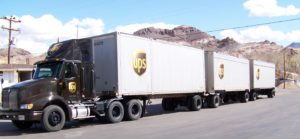Can Speed Limiters Prevent Trucking Accidents?
 Toward the end of the summer, the U.S. Department of Transportation (DOT) announced that the National Highway Traffic Safety Administration (NHTSA) and the Federal Motor Carrier Safety Administration (FMCSA) together were proposing to equip “heavy-duty vehicles with devices that limit their speeds on U.S. roadways, and requiring those devices to be set to a maximum speed,” according to a news release from the FMCSA. The speed limiters, the agencies believe, could have the ability to prevent deadly trucking accidents in addition to saving more than $1 billion in the cost of fuel due to lower traveling speeds.
Toward the end of the summer, the U.S. Department of Transportation (DOT) announced that the National Highway Traffic Safety Administration (NHTSA) and the Federal Motor Carrier Safety Administration (FMCSA) together were proposing to equip “heavy-duty vehicles with devices that limit their speeds on U.S. roadways, and requiring those devices to be set to a maximum speed,” according to a news release from the FMCSA. The speed limiters, the agencies believe, could have the ability to prevent deadly trucking accidents in addition to saving more than $1 billion in the cost of fuel due to lower traveling speeds.
According to U.S. Transportation Secretary Anthony Foxx, “in addition to saving lives, the projected fuel and emissions savings make this proposal a win for safety, energy conservation, and our environment.” Can the requirement of speed limiters truly make the difference?
Safety Standards Under the Proposed Rules
Under the proposed rules, “all newly manufactured U.S. trucks, buses, and multipurpose passenger vehicles with a gross vehicle weight rating more than 26,000 pounds” would have to “come equipped with speed limiting devices.” Would all vehicles have the same speed limits? In its current incarnation, the agencies have proposed three different maximum speed levels of 60 miles per hour, 65 miles per hour, and 68 miles per hour—the vehicle’s speed limiter could be set accordingly. At the same time, the agencies have indicated that they are open to public input concerning the maximum speeds permitted by the devices.
It is important to recognize that even a few miles per hour can indeed make a difference. As NHTSA Administrator Mark Rosekind explained, “even small increases in speed have large effects on the force of impact.” As such, Rosekind clarified, “setting the speed limit on heavy vehicles makes sense for safety and the environment.”
Who would be responsible for setting and maintaining the speed limiters? Any company that has commercial vehicles operating in interstate commerce would be required to set the maximum speed limit on the device and to take steps to ensure that the devices are working properly.
Truckers Argue Speed Limiters May Not Prevent Crashes
While research from the agencies cited above suggests that speed limiters could prevent trucking crashes on the highways and could also positively impact environmental protection efforts, some truckers do not agree with the proposed rule. According to a report from NBC News, some truckers believe that speed limiters will result in “hazardous speed differentials between cars and trucks.” In other words, if trucks travel at a lower speed, cars will be engaging in varied maneuvers to pass those trucks, and such actions may prove more dangerous than trucks traveling at high speeds.
However, research seems to suggest otherwise. The American Trucking Associations (ATA) recognizes that “speed is a major contributor to truck accidents,” according to the NBC News report, and legislators across the country agree. Moreover, in regions where trucking companies already have installed speed limiters, those companies contend that fewer accidents are occurring.
Contact a Chicago Trucking Accident Attorney
Truck accidents often result in serious and fatal injuries. If you or someone you love sustained serious personal injuries in a crash, an experienced trucking accident lawyer in Chicago can help. Contact Woodruff Johnson & Evans Law Offices today to discuss your options.
